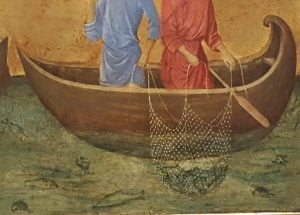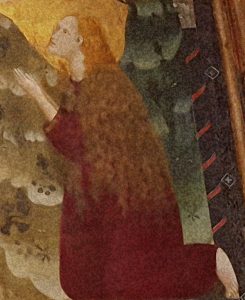
In reading the Gospel of Luke 5: 1-11 we discover minor miracles which are nevertheless life changing.
Reading the Gospel aloud invites the audience to experience human encounters with the divine as revealed in the Bible. We leave interpretation and meaning to members of the clergy and other scholars. What we’re most interested in as lay readers is the human experience found in the narrative.
‘Go away from me, Lord, for I am a sinful man!’
This excerpt is included in the revised common lectionary, provided by the Vanderbilt Divinity Library. The text is from the NRSV.
Hear a recording of this passage.
First Impressions
What impresses you most as you read through this passage for the first time?
These are minor miracles. These events are experienced by an intimate and named group of people. They speak directly to the experience of their daily lives/livelihood: fishing. Fishing is something the disciples thought they knew a lot about. But what is about to happen to them is truly amazing. There should be no fish here. But there are fish in abundance. And they are to become fishers of people.
Jesus performs a miracle of the mundane. It’s not so much awesome as it is profoundly disruptive. Its impact is recognized and felt immediately by Simon Peter. He knows there should be no fish to be had, and yet he and his partners are nearly overwhelmed by the catch.
Fishing for fish with nets is a collective task. It requires PARTNERS. Simon Peter has partners. The fishing for people is a group effort as well. Even Jesus recognizes the need for partners and catches Simon Peter as a partner. The fishermen become Jesus’ partners. They follow him.
Those who are called – even directly by God – are at first reluctant. The initial reaction is, “This is beyond me. I’m not worthy. “I am a sinful man” and not deserving. But Jesus is patient. We will all have a new mission: to use the skills we have, to do something new and different. Something that will be world changing. In the case of Simon Peter, it’s fishing.
This passage proceeds rapidly. One event leads quickly to next. Jesus almost seems to be improvising: “He saw two boats…” and had the brilliant idea to teach from the boat. Then “When he had finished speaking…” he invites Simon Peter and his crew to go fishing. Here the unexpected and seemingly spontaneous choices yield miraculous results. The result is an unexpectedly large catch of fish… and disciples.
Text Analysis
We’re looking for words and phrases that make vivid the experience described in the reading. We’re also looking for keys to the subtext.
Language: The language in this passage is plain and simple. It’s the language of working fishermen. “Put out,” “Let down your nets,” “the catch.” All of these set up the metaphor of fishing for people.
Dynamics: This is an action passage. There’s some dialogue but mostly we have a description of what’s happening: the crowd pressing as we move from shore to boat, to deep water, and then the catching of fish. Anyone who has been fishing knows that when the catch is hauled in, there is intense activity on the boat. The nets are beginning to break. They fill the both boats to the point of sinking.
Narrative: The general arc of the narrative is the same way in which Jesus catches people. There’s the initial move to a boat which the crowd must have seen as ingenious as they can now all hear the word of God without pressing in; it’s a brilliant solution to a practical problem and is captivating. He gets their attention. The second beat is drawing Simon Peter and his partners out into deeper water and convincing them to cast their nets to draw in fish. Three: the struggle of Simon Peter (“Go away from me, Lord…” effectively, please release me,) and Jesus’ drawing him in: do not be afraid, let’s now go fishing for people.
After the catch of a lifetime, they abruptly leave everything behind to follow Jesus.
Reading this passage aloud
This is a mostly positive – if not simply amazing – experience for all. The reading should be infused with energy.
Most readers will stall at the pronunciation of Gennesaret. But from a purely technical standpoint, the bigger challenge is a hard word pair to read aloud: “Jesus’ knees.” Most readers will fumble this as “Jesus knee.” You want to put the emphasis on “knees” and finish with a strong zzz sound.
In the first paragraph, the reader should try to bookend standing on the shore, with the crowd pressing in on Jesus, with sitting in the boat teaching. Jesus does not wholly depend on miracles, he embraces marvelously simple solutions as well like preaching from offshore.
The names and details as provided are important in this reading. This should be a day that all remember and are able to recount in detail.
The ending is abrupt: they leave everything and follow him. The end is inevitable: they follow him. Simon Peter uses the title “Master” in addressing Jesus. Which proves to be true and ultimately, Peter can’t resist him.

